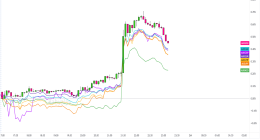
The pandemic has forced the traditional holiday office party to go virtual.
Fear of spreading coronavirus, prohibitions against in-person gatherings of size, and remote colleagues dispersed to far corners — or at least the suburbs — have forced companies to get creative and flexible with their online party planning
Forget the open bar, dance floor and warmed-over hors d’oeuvres. And if you meet your co-workers’ spouses, it’s because they accidentally walked by in the background.
Some businesses are going big, booking live entertainment and virtual game rooms, and sending care packages to workers’ houses.
Other companies are taking a lower key approach, trying to avoid laying another demand on burned-out telecommuters and just gathering for a virtual toast.
And many firms are forgoing the classic end-of-year party entirely. Just nearly 25 percent of companies are hosting a holiday party of any kind this year, a plunge from about 75 percent last year, according to a survey by the workplace consulting firm Challenger, Gray & Christmas. A handful, just over 5 percent, said they would still host an in-person event.
Nearly half of those canceling their parties said it was specifically because of Covid-19, survey respondents said. Almost three-quarters of those holding events are doing so virtually.
PayPal threw a 29-hour event for its 23,000 global employees, with performances from international drum and bass DJ Annie Mac, “TRON LED dancers,” cocktail and mocktail workshops, a drag show, and “Rua the Illusionist,” according to a company electronic flyer. Employees could pop in and out as they wished.
The car-hailing service Uber isn’t planning any company-wide holiday events. Instead, it banned meetings from Dec. 23 to Jan. 1, and is letting individual departments plan their own parties.
The tech giants Google and Intel are also leaving it up to individual departments to figure out how to celebrate virtually, according to employees who spoke with NBC News.
The financial software company Intuit opted to skip a party this year and instead donated $1 million to help students in underserved communities and match employee donations up to $2 million.
Dawn Mitchell, vice president of human resources at the cloud computing company Appian, which has 1,200 employees, said she limited their company-wide holiday party to 90 minutes.
“The timing allowed almost everyone to attend during work hours and didn’t impede anyone’s weekend,” she said.
One company’s pain is another’s service opportunity. Now businesses are looking to help cash in on the virtual holiday party trend.
The video-conferencing service Zoom is removing its time limit for nonpaying members over the holidays. The networking app Upstream launched a “holiday mixer” service to let guests chat in a virtual lobby and get matched for one-on-one breakout chats.
Artery, a startup that organizes gatherings and performances, built Bramble, a video chat room that attempts to give attendees the feeling they’re actually at a party, still in private beta. As users move their avatars closer to other guests to mingle, the other guests’s video screens and audio fade in, and then out as as they move away.
The coronavirus-affected holiday season has also been a boon for companies to market a “party in a box,” with cocktail kits, wine tasting classes, and games.
The startup PizzaTime arranges for orders to be placed and delivered from local pizzerias. And Board at Home, another Covid-19 startup, curates artisanal cheeses and charcuterie from local vendors in California and ships in party-ready packages.
Despite organizers’ best intentions, some workers say they feel ground down by the pandemic and juggling work-at-home for the past nine months, and aren’t looking forward to another mandatory video call, even if silly hats, Christmas sweaters and adult beverages are encouraged. Instead of a virtual holiday party, they’d rather have more time off.
But others say they appreciate the opportunity in this anxious limbo to bond with colleagues outside the daily grind.
Mary Rising, an engineering manager at Greenlight Financial Technology, a company that makes reloadable debit cards for children, said she was thrilled to receive a painting kit and a group lesson over video chat as her department’s holiday celebration.
“I got to see a totally different side of the people I work with, which made this holiday party more unique than the ones in the past,” she said.
While she enjoyed meeting her co-worker’s significant others last year, this year there are some upsides, like not having to drive anywhere.
“And, of course, no one got a hangover,” Rising said.
Source: | This article originally belongs to Nbcnews.com










